29 Aug 2019 | Iran, Media Freedom, News and features
[vc_row][vc_column][vc_single_image image=”108837″ img_size=”full” add_caption=”yes”][vc_column_text]On 24 August 2019 Kioomars Marzban, a 27-year-old satirical writer from Iran, was sentenced to 23 years and 3 months in prison. He was found guilty on five separate charges, given a two-year travel ban, and a two-year ban on publishing or using social media.
Marzban left Iran in 2009 and had been living in Malaysia for nearly a decade, from where he wrote for Iranian diaspora programmes, including Radio Farda and the London-based media network Manoto. He returned to Iran to spend time with his sick grandmother in early 2018. On his return, he began leading creative writing workshops and had referred to some of his work abroad.
In early September 2018, authorities arrested Marzban on charges relating to his satirical writing. They raided his house and confiscated his laptop, mobile phone, and writing materials. He was only permitted to appoint a lawyer several months after being detained.
Following his arrest, a website affiliated with the Iranian Revolutionary Guard Corps (IRGC) falsely claimed that Marzban had travelled to the United States in order to set up an anti-Iranian media outlet. The website said that the outlet would have been “aimed at inflaming the people and creating social divisions”. Marzban is understood to have only ever travelled to Georgia (in the Caucasus) during his time in Malaysia.
The IRGC also accused Marzban of cooperating with the human rights organisation Freedom House, which according to them is “a project of American intelligence to push the issue of human rights internationally through media organisations”.
Marzban was sentenced to 11 years for “communicating with America’s hostile government”, 7 years and 6 months for “insulting the sacred”, 3 years for “insulting the [supreme] leader”, 1 year and 6 months for “propaganda against the state”, and 9 months for “insulting officials”.
Condemning the sentencing of Kioomars Marzban, Jodie Ginsberg, Chief Executive of Index on Censorship, said “Kioomars has been given a sentence that would put him in jail for almost as long as he has been alive, meaning he would not be freed until 50. And all because he poked fun at power through writing. We urge satirists worldwide to condemn his jailing and for states who claim to support freedom of expression to demand his immediate release ”.[/vc_column_text][vc_basic_grid post_type=”post” max_items=”4″ grid_id=”vc_gid:1567097330224-5056a739-f424-9″ taxonomies=”8996″][/vc_column][/vc_row]
11 Feb 2019 | Magazine, News and features, Student Reading Lists
[vc_row][vc_column][vc_column_text]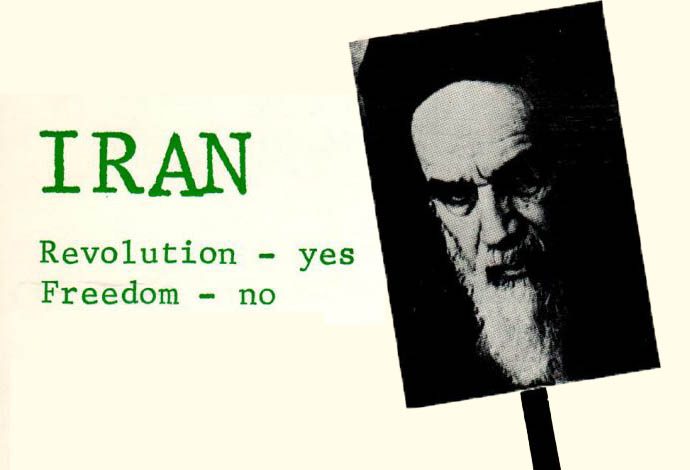
Forty years ago, on 11 February 1979, the rule of Mohammad Reza Pahlavi, the last shah of Iran, came to an end after millions of Iranians, from all backgrounds, took to the streets in protest at what they saw as an authoritarian, oppressive and lavish reign.
After decades of royal rule, and following 10 days of open revolt since the return of Ayatollah Khomeini to the country after 14 years of exile, Iran’s military stood down. With Pahlavi forced to leave the country, the Islamic Republic of Iran was declared in April 1979.
Here Index on Censorship magazine highlights key articles from its archives from before, during and after the revolution, an event that has since shaped the entire Middle East and has had a lasting impact to this day.
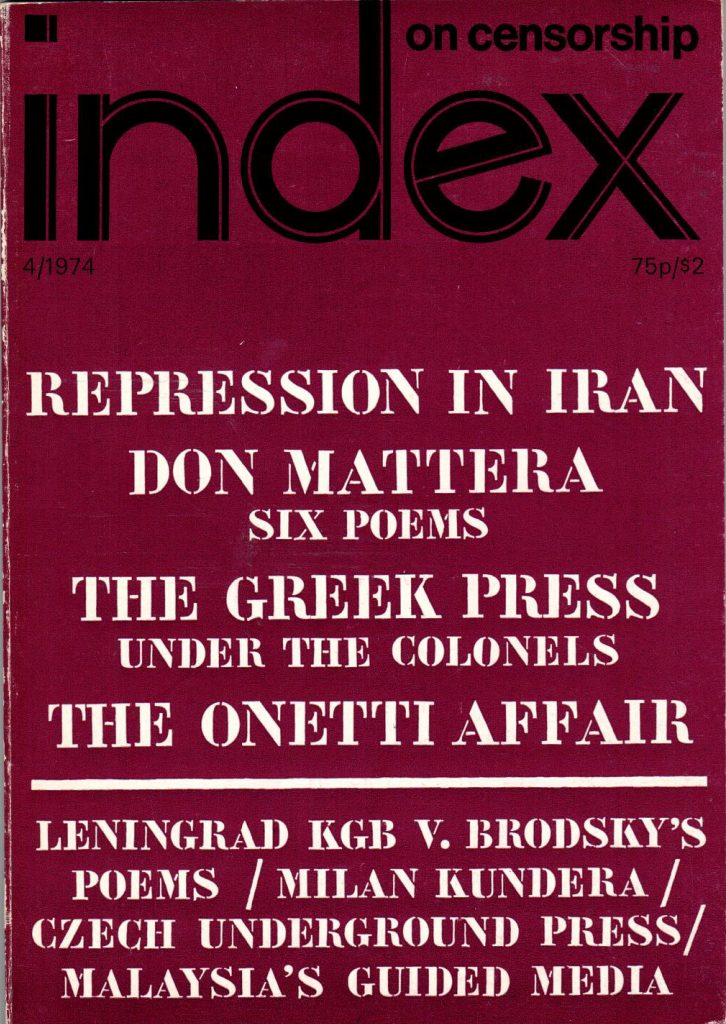
Repression in Iran , the Winter 1974 issue of Index on Censorship magazine
Repression in Iran
Ahmad Faroughy
December 1974, vol. 3, issue 4
In October 1972, the shah of Iran celebrated the 2,500th year of Persian Monarchy which, despite twenty national dynastic changes, has constantly endeavoured to remain Absolute. Although the aim of this article is not to debate the political merits and demerits of autocracy as a means of government, it is obvious that whatever minor benefits Iran may have derived from hereditary dictatorship, freedom of expression is certainly not one of them.
Read the full article

China: Unofficial texts, the September 1979 issue of Index on Censorship magazine
The press since the shah
M. Siamand
September 1979, vol. 8, issue 5
The Muslim clerical establishment had not been decimated, and the various peoples of Iran, showing a remarkable unanimity, rallied behind the exiled Ayatollah to overwhelm the imperial army into submission by staring it In the face. What the great majority of observers regarded as impossible has come to be: the minority cultures seem no longer in danger of quick extinction, and everyone is engaged in an exhilarating debate about the future. But unfortunately, threatening clouds can be seen gathering on the horizon. The revolution has not yet started to devour its own children, yet some powerful men in the new hierarchy are already saying that it might have to do so: secular, democratic opponents of the former regime are denounced as counter-revolutionaries, most clergymen seem determined to turn Iran into an intolerant theocracy and a cultural backwater, and martyrdom for Islam is held up for the young as the highest achievement they should aim at.
Read the full article

The rebirth of Chilean cinema in exile, the April 1980 issue of Index on Censorship magazine
Explaining Iran
Edward Mortimer
April 1980, vol. 9, issue 2
An extraordinary exhilaration gripped the Iranian people as the revolution at last triumphed and the remnants of the imperial regime suddenly crumbled away. One returns to confront the irritation of a European intelligentsia which is at once alarmed by the possible consequences of the Iranian revolution and perplexed by the fact that it does not quite fit into any of the ideological pigeon-holes which Western thought had prepared for it; and one is expected to atone by taking responsibility for the events which follow it.
Read the full article

Iran: Revolution – yes, Freedom – no, the June 1981 issue of Index on Censorship magazine
Iran since the shah
Leila Saeed
June 1981, vol. 10, issue 3
Concern for the restoration of social justice, for basic human rights, as well as national independence, provided the fundamental motive for the formidable mass movement which brought down the Pahlavi dynasty in February 1979. Iranians of different social backgrounds, ethnic and religious groups, of different creeds and ideologies came together in their revolt against the oppressive and arbitrary regime. And it was religion which provided the formal channels and the leadership by means of which the opposition expressed its demands and conducted its struggle.
Read the full article

Writers and Apartheid, the June 1983 issue of Index on Censorship magazine.
The Islamic attack on Iranian culture
Amir Taheri
June 1983, vol. 12, issue 3
Book-burning did not become an Islamic tradition. On the contrary. The Bedouin’s enchantment in front of the written word soon prevailed over the Caliph’s ‘ impulsive outburst. Islam expanded and developed into an established religion with universal appeal, and became an accidental heir to the wisdom of the classical world which it later passed on to the West. In 1979, in the triumph of the Islamic Revolution in Iran, an echo of Omar was heard. In their hatred of the “corrupt” contemporary world, Iran’s mullahs, who had designed and led the revolution, tried to “return to the source” and recreate the early Islamic society as they imagined it. An important step in that direction was what the revolution’s Supreme Guide, Ayatollah Ruhollah Khomeini, described as “deculturisation”.
Read the full article

Samuel Beckett: Catastrophe, the January 1984 issue of Index on Censorship magazine.
Iran under the Party of God
Gholam Hoseyn Sa’edi
February 1984, vol. 13, issue 1
Censorship was planned by the regime of the Islamic Republic even before the February 1979 revolution brought Ayatollah Khomeini’s theocratic oligarchy to power. This particular kind of censorship may not be without precedent in history, but it must certainly be rare. There were attacks on coffee-houses, restaurants and other public places by men armed with clubs and stones; unveiled women were harassed; slogans of the opposition were cleaned from the walls; banks, cinemas and theatres were burned. None of this seemed to follow any specific plan, but nonetheless it just kept on happening. Men with angry faces, dressed in shabby clothes, would be seen lurking in corners; they would come out for a moment of sudden violence and then disappear again. An astute observer might have called those attacks wounds on the body of the revolution as it was in the process of taking shape, but not many people noticed, and consequently they saw this deranged behaviour simply as a sign of revolutionary anger and class hatred.
Read the full article
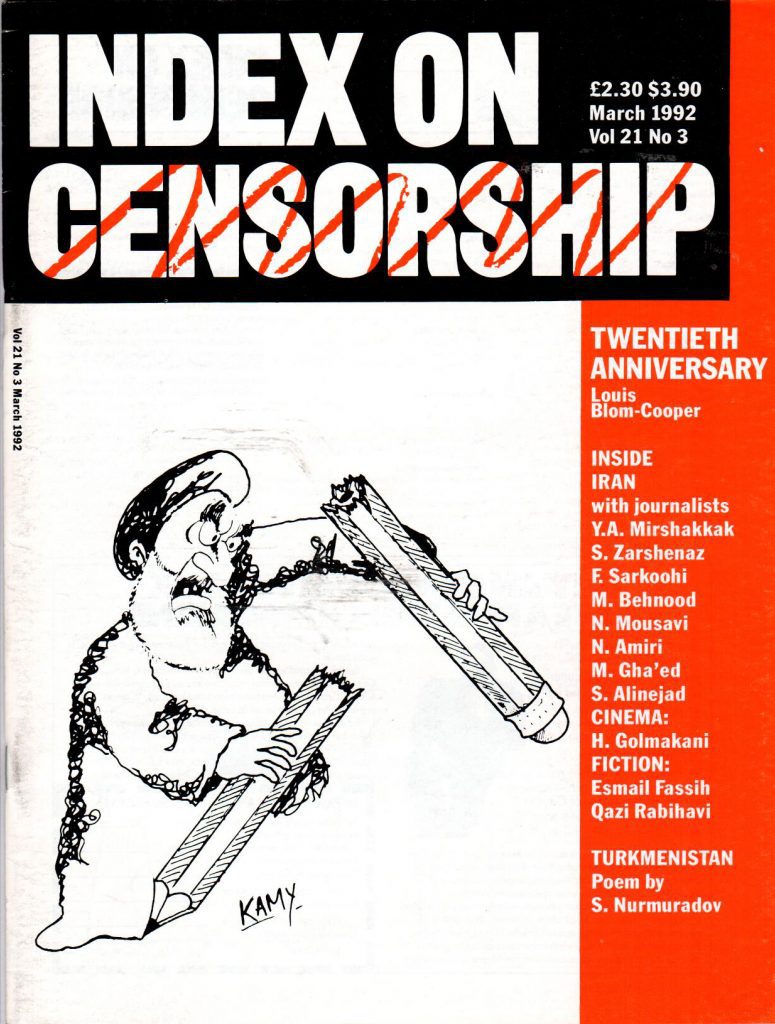
20th Anniversary: Freedom and responsibility, the March 1992 issue of the Index on Censorship magazine.
Inside Iran: A Special Survey
Gholam Hoseyn Sa’edi
March 1992, vol. 21, issue 3
Index brings together opposing views on the nature of human rights, freedom of expression and democracy within the Islamic Republic of Iran. This unique confrontation, first presented on 14 December 1991 on the UK’s independent Channel 4 TV programme South, reveals the gulf that separates the ‘universal’ principles of the Western Christian/humanist tradition from the theocentric teachings of Islam on the same matters. Even within Iran, the battle between rival and opposing interpretations of Koranic teaching on these subjects reaches into the highest levels of government.
As the Iranian journalist Enayat Azadeh, intimately connected with the film, himself says, we are not talking about anything as simple as those who are for and those who are against the Revolution. Committed supporters of the Islamic state who, influenced by education and inclination, wish to incorporate Western liberal ideas into Islamic thinking on, for instance, freedom of expression in the media or the arts, find themselves at odds with the pure Islamists who will brook no interference with the integrity of Islam
Read the full article
[/vc_column_text][/vc_column][/vc_row][vc_row][vc_column][vc_basic_grid post_type=”post” max_items=”4″ element_width=”6″ grid_id=”vc_gid:1549892591542-afaf5ec8-5514-0″ taxonomies=”8890″][/vc_column][/vc_row]
16 Jul 2018 | Global Journalist, Iran, News and features
[vc_row][vc_column][vc_column_text]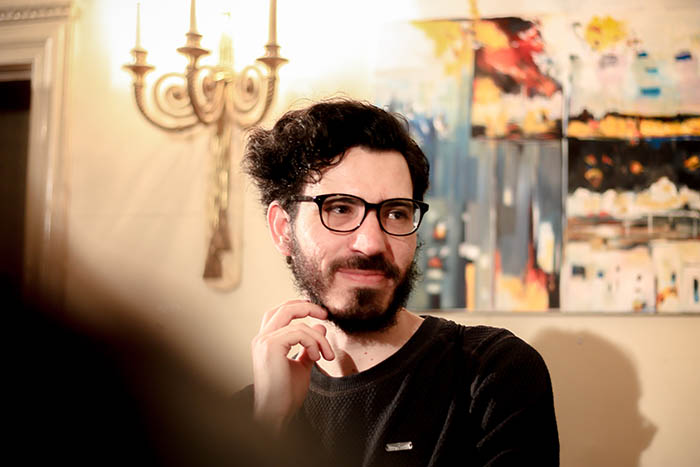
In 2009, incumbent president Mahmoud Ahmadinejad won Iran’s highly contested election against Mir-Hossein Mousavi, which led to public outrage and the formation of the Green Movement, filling the streets with demonstrations calling for Ahmadinejad’s ouster. For the next two years, Iranian authorities ran a campaign of jailing journalists and political opponents. Journalist Omid Rezaee was one such detainee.
The Iranian-born mechanical engineering student was the editor-in-chief of Fanous, a student magazine which was banned for standing with the Green Movement. Rezaee was arrested in October 2011.
In 2012 he fled to Iraq, and in 2015 he made his way to Germany. In February 2017 he started his own multilingual website, Perspective Iran, where news about Iran is mainly reported in German. He has also been working as a freelance writer within German media outlets since he was exiled. Rezaee aims to show the many hidden aspects of Iran and the nature of the everyday lives of its people.
Index on Censorship: You became a journalist at a very young age. What made you choose this career path so early?
Omid Rezaee: Storytelling excites me and has done so since childhood. It’s the first thing I learned about myself. First by reading stories – whether journalistic and media stories or fiction – and then by telling stories. When I was 10, I founded a small magazine in the primary school which failed after only two editions. By 15, I founded the second one in the first year of high school. This one was published for one year and by 17 I founded the next one which was being distributed in all high schools of our town and which brought me to the attention of the authorities for the first time. But I still think this was worth all the troubles because it gave me the opportunity to narrate stories. It’s the most delightful thing in this world.
Index: Why did you leave Iran?
Omid: The idea of leaving the country popped in my mind while I was sitting alone in a cell for days and nights without being able to see or talk to anyone. I was asking myself for how much longer I can bear this situation. When I was sentenced to two years in prison, I had to think about it more seriously. There are many reasons – both private and political – which led to my decision to leave the country. I would say the most important one – which still applies – is that I missed my freedom. First and foremost the freedom of speech, but it’s also freedom of lifestyle.
Index: Walk us through your migration on foot to Iraq.
Omid: Apart from the dangers and physical and technical things, I would never ever forget the moment I crossed the border as if it was the end of the earth. I would never forget how I looked back to the soil, the ground which used to be my homeland. I guess there is a huge difference when you leave the country by a plane and don’t see that “border”. And when you cross it on foot and you know, you won’t be back soon. This grieves you deeply.
Index: You are an active writer online. How do you think the internet has changed journalism?
Omid: I’ve started a professional career online and I am now studying digital journalism. By now it’s part of me and I’m part of the digital world. Honestly, I have no clue how the professional journalism used to work before it was online. But the fact that I can still report on Iran and the Middle East, even though I’ve been away for years, is directly due to the internet and online world. Apart from all the troubles we’re facing, we are closer to each other because of the internet. And more important: the digital world gives us – the journalists – more possibilities to strive against illegitimate authorities all over the world.
Index: How have you settled into life away from home?
Omid: It’s not true if I say I don’t miss my hometown, the city I studied in and the people I loved – or still love – and who love me. But the bottom line is that home is where one is free, where one can develop himself and live with dignity. I have a lot of good memories of Iran and I deeply miss a lot of people there, but I never considered Iran as a home, and it’s the same here in Germany. My home is my language. I don’t mean Farsi; I love German just as much my mother tongue, and this applies to the English language and the languages I’m learning right now. My home is the story I’m telling and I’m settling into my new life by telling stories. I am firmly convinced that only storytelling can rescue us.[/vc_column_text][/vc_column][/vc_row][vc_row disable_element=”yes”][vc_column width=”1/2″][vc_video link=”https://youtu.be/6BIZ7b0m-08″][/vc_column][vc_column width=”1/2″][vc_column_text]Index on Censorship partner Global Journalist is a website that features global press freedom and international news stories as well as a weekly radio program that airs on KBIA, mid-Missouri’s NPR affiliate, and partner stations in six other states. The website and radio show are produced jointly by professional staff and student journalists at the University of Missouri’s School of Journalism, the oldest school of journalism in the United States. [/vc_column_text][/vc_column][/vc_row][vc_row full_width=”stretch_row_content”][vc_column][three_column_post title=”Global Journalist / Project Exile” full_width_heading=”true” category_id=”22142″][/vc_column][/vc_row]
3 May 2018 | Journalism Toolbox Spanish
[vc_row][vc_column][vc_custom_heading text=”El respeto y el civismo son los enemigos de la libertad de expresión: no se puede legislar para los sentimientos de la gente”][vc_row_inner][vc_column_inner][vc_column_text]
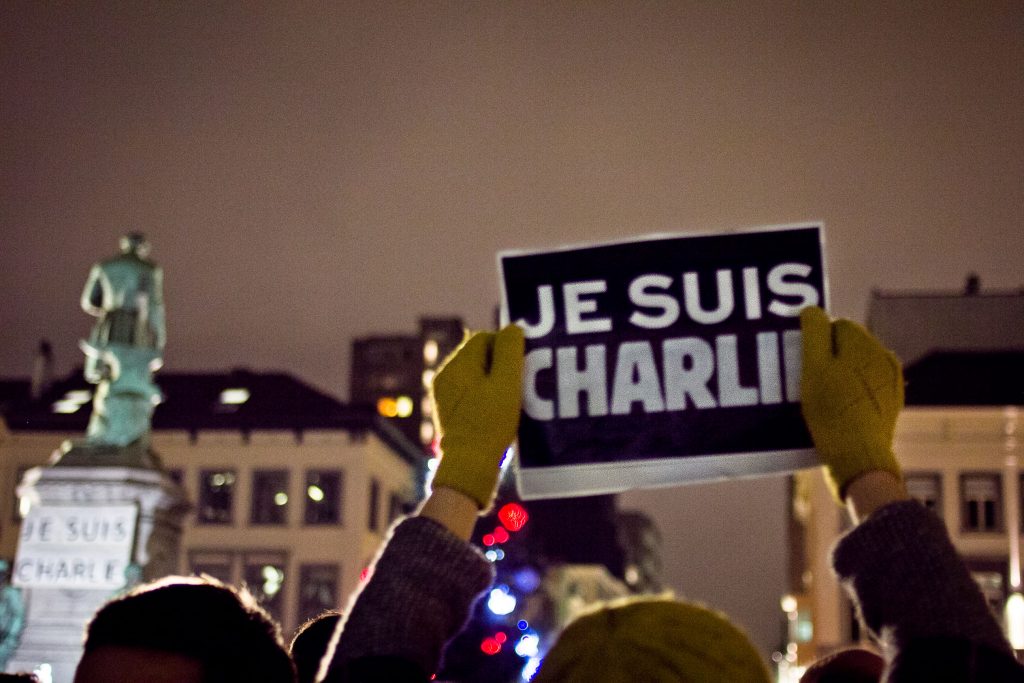
Un cartel de “Je suis Charlie” en una vigilia por los periodistas asesinados en el atentado de Charlie Hebdo en Francia, 2015, Valentina Calà/Flickr
[/vc_column_text][/vc_column_inner][/vc_row_inner][/vc_column][/vc_row][vc_row][vc_column][vc_column_text]
«Es evidente que el antiguo equilibro entre la libre expresión y el respeto por los sentimientos de los demás se hace cada vez más insostenible», se lamentaba Simon Jenkins, «pope» del columnismo, en el Sunday Times. Se refería a la polémica, por entonces en plena ebullición, sobre la tira cómica que publicó el periódico danés Jyllands-Posten parodiando al profeta Mahoma. «No puede haber mejor defensa de la libertad de expresión que frenar sus excesos y respetar su cortesía», concluía Jenkins.
Un año más tarde, la revista satírica francesa Charlie Hebdo y su director eran procesados en un caso llevado a los tribunales por dos organizaciones musulmanas, que denunciaban una agresión pública contra un grupo de personas a causa de su religión («injure stigmatisant un groupe de personnes à raison de sa religion»). La revista había reproducido aquellas tiras cómicas e incluido una de su propia cosecha en la cubierta. En marzo de 2007, el tribunal falló a favor de Charlie Hebdo y desestimó la denuncia de las organizaciones musulmanas.
Jenkins es la voz de la moderación y el civismo. Libertario declarado en cuestiones de reformas de leyes que van desde la homosexualidad hasta la caza del zorro, su visión es que una sociedad justa ha de esforzarse por mantener valores en equilibrio, en lugar de perseguir exigencias de absolutismo por un lado a costa del otro. Su análogo estadounidense podría ser la escritora KA Dilday. Acerca del caso de Charlie Hebdo, Dilday declaraba en la web de openDemocracy no considerarse «ferviente partidaria de controlar qué puede expresarse y qué no». Sí ve, sin embargo, «cierto sentido de la justicia» en procesos como el mencionado arriba. Al fin y al cabo, son un modo efectivo de estimular el debate y llamar la atención sobre querellas, si bien en un sentido que los «guerreros-filósofos» franceses, defensores del término, no reconocen.
La voz de la moderación, el civismo y el equilibrio es, en resumen, políticamente tóxica. Fabrica el falso supuesto de que ser considerados con los sentimientos de los demás —una virtud en los asuntos privados— es de la incumbencia de las políticas públicas. Esta idea ha de rechazarse frontalmente cuanto antes.
El conflicto entre las sensibilidades religiosas y la libertad de publicación proviene de mucho antes que el asunto de las caricaturas danesas. No obstante, en la política y sociedad británica, los principales denunciantes hasta la década de 1990 eran cristianos ortodoxos que ponían de manifiesto su preocupación por la erosión generalizada de las buenas costumbres. En 1977, Mary Whitehouse, en nombre de la National Viewers’ and Listeners’ Association, ganó una sonada victoria legal en una acción judicial contra el periódico Gay News. El objeto de su repulsa era un poema en el que Jesús salía representado como un homosexual promiscuo; según ella, una calumnia blasfema contra la fe cristiana. Incluso en aquel entonces, la opinión general vio la condena como un caso de idiosincrasia jurídica y anacronismo social. De haber defendido su denuncia como una querella por perjuicios a los sentimientos de los creyentes cristianos, no habría tenido ningún recurso legal y lo más seguro es que hubiera sido ignorada por la opinión general. Sin embargo, habría estado adelantándose a una noción que en las últimas dos décadas se ha convertido no solo en habitual en esos mismos círculos, sino casi axiomáticos entre algunos de ellos.
Más de una década más tarde, el ayatolá Jomeini emitía una fetua llamando al asesinato de un ciudadano británico, Salman Rushdie, por escribir una novela. Los líderes musulmanes del subcontinente indio ya habían condenado el libro, Los versos satánicos, por contener insultos al Islam. La fetua puso el asunto en el centro de la política internacional. Fue entonces cuando emergió un discurso distintivo en el debate occidental.
Como es el caso con muchos acontecimientos de la historia política reciente de Reino Unido, una de las fuentes más informativas —a menudo sin quererlo— son los voluminosos diarios editados del ex ministro del gobierno Tony Benn. En su entrada del día 15 de febrero de 1989, Benn describe un debate sobre el caso de Rushdie en una reunión del equipo de campaña de los diputados laboristas de izquierda. Algunas de las respuestas que recoge, si bien plagadas de clichés, son claramente reconocibles como consignas tradicionales de la política radical: «Mildred Gordon [antigua trotskista que se hizo diputada cumplidos los 60] dijo que todos los fundamentalistas y todas las iglesias instituidas son enemigos de los trabajadores y el pueblo». Pero Benn pasa después a Bernie Grant, diputado por Tottenham, ya fallecido, a menudo señalado —erróneamente— como uno de los primeros diputados negros de Reino Unido. Benn declara: «Bernie Grant seguía interrumpiendo, diciendo que los blancos querían imponer sus valores sobre el mundo. La Cámara de los Comunes no debería atacar a otras culturas. No estaba de acuerdo con los musulmanes de Irán, pero apoyaba su derecho a vivir sus vidas como quieran. Sostenía que para los negros había problemas más graves que la quema de libros».
La idea de que la libertad de expresión es una imposición etnocentrista sobre otras culturas, hacia la cual una política verdaderamente igualitaria extendería su respeto, se ha desarrollado enormemente desde entonces, de un modo menos crudo y populista. La forma descafeinada de ese principio es que una cultura fundada en ideas compartidas libremente ha de refrenarse ante las sensibilidades de los demás. En palabras del erudito islámico Tariq Ramadan: «En lugar de obsesionarnos con leyes y derechos —acercándonos a un derecho tiránico a decir cualquier cosa—, quizá sería más prudente llamar a todos los ciudadanos a ejercer su derecho a la libertad de expresión de forma responsable y tener en cuenta las diversas sensibilidades que componen nuestras sociedades modernas y plurales».
Sentimientos como este se afianzaron a cuenta de lo de Rushdie, y han demostrado ser un componente duradero de nuestra cultura política. En 1990, un año después de la fetua, Rushdie escribió: «Siento como si me hubieran arrojado, como Alicia, a un mundo más allá del espejo, en el que el sinsentido es el único sentido disponible. Y me pregunto si alguna vez seré capaz de salir».
Los líderes de occidente son expertos en hablar desde ese sentido que menciona. El primer presidente Bush respondió audazmente, una semana después de la emisión de la fetua, que la amenaza de asesinato era «profundamente ofensiva». El gobierno japonés declaró con ansiedad que «mencionar y promover el asesinato no es algo digno de alabanza». El Gran Rabino de Reino Unido, el Dr Immanuel Jakobovits, observó con evidente imparcialidad, pero genuina estupidez rayando en la crueldad: «Tanto el Sr Rushdie como el Ayatolá han abusado de la libertad de expresión».
[/vc_column_text][/vc_column][/vc_row][vc_row][vc_column][vc_column_text]
Analizando estas sentencias, el escritor Jonathan Rauch, en su libro de 1993 Kindly Inquisitors (del cual extraigo las citas), identificó la tendencia, entre los intelectuales de occidente, de repudiar la sentencia pero no la idea de que Rushdie había cometido un crimen: «Si seguimos por este camino, significa que aceptamos el veredicto de Jomeini y simplemente le estamos regateando la sentencia. Si la obedecemos, aceptamos que en principio lo que ofende debería reprimirse, y lo que hacemos es discutir qué ofende y qué no… eso sí es ofensivo».
Este es el elemento ausente en el debate sobre el alcance y la regulación de la expresión. La idea de que expresarse con libertad, si bien es importante, ha estar en equilibrio con evitar la ofensa es petición de principio, ya que da por sentado que la ofensa es algo que ha de evitarse. La libertad de expresión, en efecto, hiere, pero no hay nada de malo en ello. El conocimiento avanza gracias a la destrucción de malas ideas. La burla y el escarnio se cuentan entre las herramientas más poderosas de ese proceso. Tomemos por ejemplo Cándido de Voltaire, o los escritos de H.L. Mencken sobre el caso del juicio de Scopes, saturados de desprecio por los oscurantistas religiosos que se oponían a la enseñanza de la evolución en las escuelas de Tennessee.
Es inevitable que se ofendan quienes ven a otros mofarse de sus más profundas convicciones, y es posible —aunque no obligatorio, y se da el caso de que no sale de mí— extenderles simpatía y compasión. Pero no tienen derecho a protección, mucho menos compensación, en la esfera pública, por muy groseros y repugnantes que sean los sentimientos expresados. Una sociedad libre no legisla en el reino de las creencias; por ende, no debe ocuparse tampoco del estado de las sensibilidades de sus ciudadanos. Si lo hiciera, no habría en principio ningún límite a los poderes del estado, ni siquiera en el ámbito privado del pensar y el sentir.
No le ha ayudado al debate —si acaso lo ha empañado aún más— un uso impreciso de la palabra «respeto». Si se trata de una mera metáfora del libre ejercicio de la libertad religiosa y política, entonces es un principio incuestionable, pero también un uso redundante y poco claro. El respeto por las ideas y aquellos que se aferran a ellas es otra historia. Las ideas no tienen derecho a nuestro respeto; se ganan el respeto según su capacidad de hacer frente a las críticas. Incluso algunos fervientes defensores de la libertad titubean en este punto. El activista pro derechos humanos Peter Tatchell escribió hace poco acerca de un debate televisivo particularmente sesgado: «Hasta los musulmanes supuestamente moderados del programa de anoche exudaban un tufillo a hipocresía. Ibrahim Mogra, del Consejo Musulmán Británico (MCB), dijo: ‘No queremos imponerle nuestro modo de vida a nadie. Lo único que queremos es vivir en el respeto mutuo’. Nobles sentimientos. Una pena que no sea la realidad». Resulta que exigir respeto no es un noble sentimiento. Es, como mucho, una cualidad que se obtiene a través de la robustez intelectual de las ideas de uno en la arena pública.
Un añadido más que complica el debate es un retorno —uno bastante oportunista, por cierto—, al concepto de las costumbres y su subclase, los tabús. En diciembre de 2006, el régimen teocrático iraní organizó una conferencia en la que negaban el Holocausto, al parecer, como un gesto de represalia por la caricatura danesa. Se da la casualidad de que participé en un debate en Londres al mes siguiente con un representante del Consejo Musulmán Británico, Inayat Bunglawala, que trató las dos provocaciones como análogas de forma explícita. No había «necesidad», decía, de montar la conferencia, un malentendido total de las bases de la objeción. La negación del Holocausto está mal, no porque sea ofensivo, sino porque es falso. Es una hipótesis especulativa que puede mantenerse de forma coherente solo si se ignoran o falsifican pruebas históricas. Hay leyes en algunos países europeos contra estas forma de antisemitismo, y son desacertadas y dañinas por motivos similares a los que he expresado. La labor de exponer la falsedad de las afirmaciones de los negacionistas del Holocausto corresponde a historiadores competentes, no a los abogados. La calidad de ofensivo es irrelevante a la cuestión.
Aparte, se da una cuestión de pragmática. Si quienes tienen profundas convicciones ven que reciben compensación cuando alguien hiere sus sentimientos, estarán a la caza del sufrimiento mental. Cuando un grupo lo consiga, otros percibirán el incentivo para confeccionar exigencias comparables. En Birmingham, hace dos años, unos manifestantes forzaron el cierre de una obra de teatro, Behzti, de Gurpeet Kaur Bhatti, que describía el maltrato que sufrían las mujeres sij por parte de hombres de su misma religión. Con inepta jocosidad a la par que concisión, un corresponsal de la BBC informaba: «Si tuviéramos que escribir una sinopsis teatral para lo que Birmingham acaba de presenciar con Behzti, podríamos hacerlo en ocho palabras: ‘obra ofende a comunidad, comunidad protesta, obra cancelada’».
Los activistas de un grupo de presión llamado Christian Voice, entonces —lejos de ser una coincidencia—, insistieron en sus exigencias particulares. El espectáculo en vivo Jerry Springer: The Opera se enfrentó a protestas y amenazas de acción judicial por blasfemia cuando se retransmitió por la BBC en 2005 y de nuevo cuando comenzó su gira en 2006. «Puedo decir con convicción que el espectáculo es extremadamente vulgar, ofensivo y blasfemo», escribía el director de la organización en una carta a los teatros, instándolos a que cancelasen las funciones. Y, dado el precedente, ¿por qué no habría de exigir tal cosa?
En un intento por explicar el asunto de Behzti a sus lectores franceses, la corresponsal de Libération en Londres, Anès Poirier, escribía: «Dans une situation pareille, on attend d’un gouvernement qu’il défende l’auteur menacé». Advirtió que la ministra del gobierno británico responsable de relaciones comunitarias, Fiona McTaggart, hizo precisamente lo contrario. Más bien, McTaggart recibió de buena gana la calma que sucedió a la cancelación de la obra de teatro. A menudo nos hace falta un observador externo para apreciar verdaderamente la corrupción de nuestra propia cultura política.
Este malestar suele ser el resultado de reconocer el deber de respetar un derecho. Respetar las creencias y los sentimientos de otros es una afectación letal de las políticas públicas. Es fácil representar la libertad de expresión como proclive a causar perjuicios, precisamente porque es la verdad. El marco legal que parte de ello es contrario a la lógica, pero esencial: no hay que hacer nada. La defensa de una sociedad libre pasa por no tomar posiciones sobre lo que sale de ella, e insistir, en su lugar, en la integridad de sus procedimientos.
[/vc_column_text][/vc_column][/vc_row][vc_row][vc_column][vc_column_text]
Oliver Kamm es autor y columnista para The Times
This article originally appeared in the summer 2007 issue of Index on Censorship magazine
Traducción de Arrate Hidalgo
[/vc_column_text][/vc_column][/vc_row][vc_row content_placement=”top”][vc_column width=”1/3″][vc_custom_heading text=”What New Labour did for free speech” font_container=”tag:p|font_size:24|text_align:left” link=”url:https%3A%2F%2Fwww.indexoncensorship.org%2F2007%2F06%2Fwhat-new-labour-did-for-free-speech%2F|||”][vc_column_text]Index takes a critical look at the health of free speech in the UK on New Labour’s tenth birthday in power. New restrictions on what you can say — and where you can say it — mean we have to mind our language more than we used to. Has the UK become a less tolerant society? How much has been sacrificed in the name of national security? Leading commentators examine the defining influences of the decade on free speech in the UK and assess how far new Labour has delivered on its promises to introduce more open government.
With: Alistair Beaton; A C Grayling; Peter Wright[/vc_column_text][/vc_column][vc_column width=”1/3″][vc_single_image image=”89177″ img_size=”medium” alignment=”center” onclick=”custom_link” link=”https://www.indexoncensorship.org/2007/06/what-new-labour-did-for-free-speech/”][/vc_column][vc_column width=”1/3″ css=”.vc_custom_1481888488328{padding-bottom: 50px !important;}”][vc_custom_heading text=”Subscribe” font_container=”tag:p|font_size:24|text_align:left” link=”url:https%3A%2F%2Fwww.indexoncensorship.org%2Fsubscribe%2F|||”][vc_column_text]In print, online. In your mailbox, on your iPad.
Subscription options from £18 or just £1.49 in the App Store for a digital issue.
Every subscriber helps support Index on Censorship’s projects around the world.
 SUBSCRIBE NOW[/vc_column_text][/vc_column][/vc_row]
SUBSCRIBE NOW[/vc_column_text][/vc_column][/vc_row]










